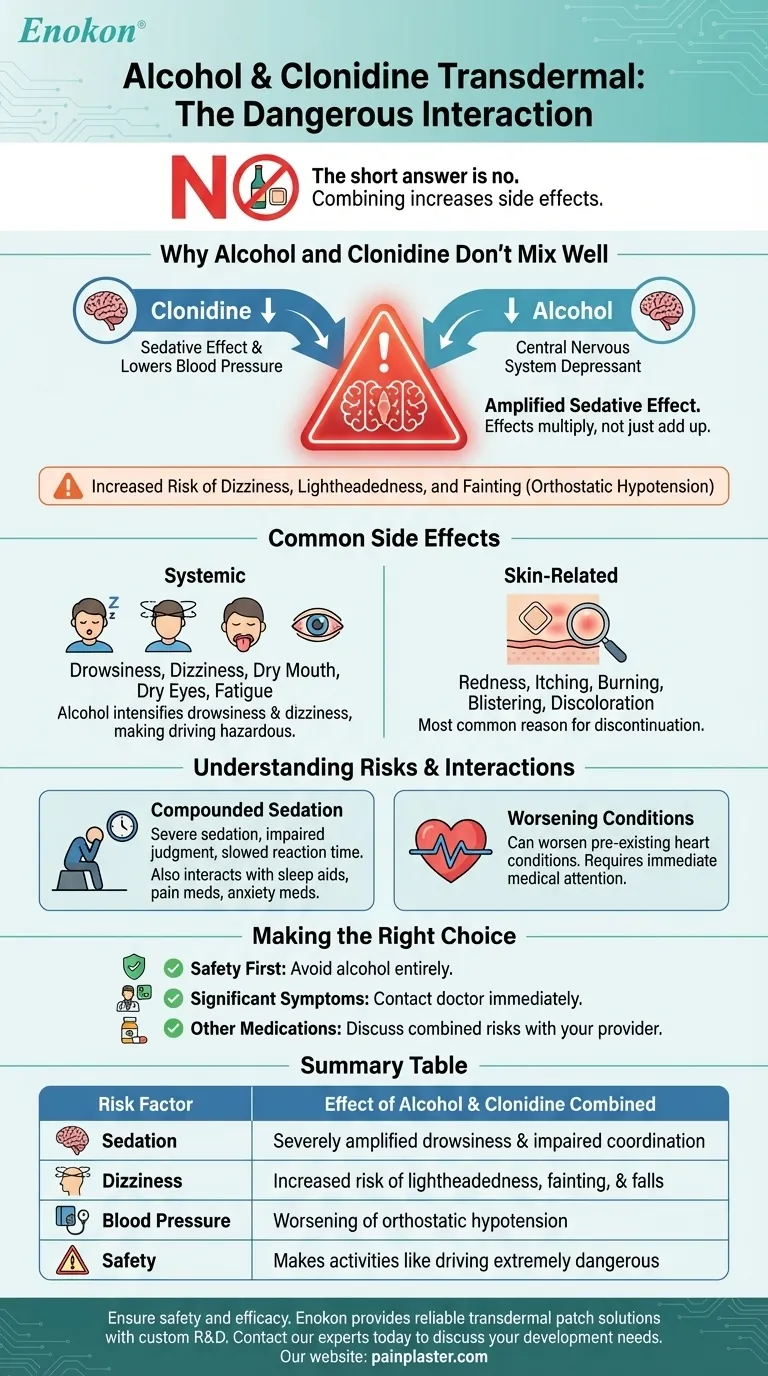The short answer is no, you should not drink alcohol while using a clonidine transdermal patch. Combining alcohol with clonidine significantly increases the risk of side effects, primarily by amplifying the sedative properties of both substances. This interaction can lead to enhanced drowsiness, dizziness, and impaired coordination.
The central risk of mixing alcohol and clonidine is the compounding effect on your central nervous system. Both substances act as depressants, and using them together can lead to a dangerous level of sedation and lightheadedness that is greater than either would cause on its own.

Why Alcohol and Clonidine Don't Mix Well
To understand the risk, it's helpful to recognize how each substance functions. Clonidine is primarily used to lower blood pressure, but it also has a notable sedative effect on the brain. Alcohol is also a well-known central nervous system depressant.
The Amplified Sedative Effect
When you combine two depressants, their effects don't just add up—they multiply.
This means the typical drowsiness or tiredness you might feel from clonidine can become much more pronounced and potentially dangerous when alcohol is introduced.
Increased Risk of Dizziness and Lightheadedness
Clonidine can cause orthostatic hypotension, which is a feeling of dizziness or lightheadedness when you stand up too quickly.
Alcohol can worsen this effect, increasing your risk of fainting or falling, which could lead to serious injury.
Recognizing the Common Side Effects
Knowing the potential side effects of clonidine alone helps you understand what alcohol will likely magnify. The most common adverse reactions fall into two categories: systemic and dermatological.
Systemic Side Effects
These effects relate to your entire body. Common issues include drowsiness, dizziness, dry mouth, dry eyes, and feeling tired.
Alcohol will almost certainly intensify the drowsiness and dizziness, making activities like driving or operating machinery extremely hazardous.
Skin-Related Side Effects
Separately, the clonidine patch itself frequently causes skin reactions at the application site.
These can include redness, itching, burning, blistering, and discoloration. In fact, localized skin reactions are the most common reason people stop using the patch, with about 19% discontinuing treatment due to contact dermatitis.
Understanding the Risks and Interactions
The interaction between clonidine and alcohol is part of a broader pattern. Clonidine's effects can be amplified by any substance that slows down your brain activity.
The Danger of Compounded Sedation
The primary risk is severe sedation. This can impair your judgment, slow your reaction time, and make you dangerously drowsy.
This interaction is not unique to alcohol. Clonidine also interacts with sleeping pills, narcotic pain medicine, muscle relaxers, and medications for anxiety, depression, or seizures.
Worsening of Pre-existing Conditions
For individuals with certain health issues, the combination can be even more concerning.
The references note that more serious effects can include the worsening of pre-existing heart conditions, which requires immediate medical attention. Always inform your healthcare providers about all medications and substances you use.
Making the Right Choice for Your Health
Navigating medication interactions requires a clear focus on safety. Your decisions should always prioritize your well-being and be made in consultation with a healthcare professional.
- If your primary focus is safety: You should avoid consuming alcohol entirely while using the clonidine transdermal patch.
- If you experience significant drowsiness or dizziness: Contact your doctor immediately, as this indicates a potentially dangerous level of interaction.
- If you take any other medications that cause sleepiness: It is critical to discuss the combined risks with your healthcare provider to ensure your treatment plan is safe.
Ultimately, open communication with your doctor is the most effective way to manage your health and use your medication safely.
Summary Table:
| Risk Factor | Effect of Alcohol & Clonidine Combined |
|---|---|
| Sedation | Severely amplified drowsiness and impaired coordination |
| Dizziness | Increased risk of lightheadedness, fainting, and falls |
| Blood Pressure | Worsening of orthostatic hypotension (dizziness when standing) |
| Safety | Makes activities like driving extremely dangerous |
Ensure the safety and efficacy of your transdermal medication offerings. As a bulk manufacturer of reliable transdermal patches, Enokon provides pharmaceutical distributors and brands with technically advanced solutions. Our expertise in custom R&D ensures your products meet the highest safety standards. Contact our experts today to discuss your development needs.
Visual Guide

Related Products
- Far Infrared Heat Pain Relief Patches Transdermal Patches
- Far Infrared Deep Heat Relief Patches Medicated Pain Relief Patches
- Heating Pain Relief Patches for Menstrual Cramps
- Herbal Eye Protection Patch Eye Patch
- Asthma Cough and Pain Relief Patch for Adults and Kids
People Also Ask
- Are heat patches safe for all body parts? Key Safety Zones and No-Go Areas Explained
- What did the UK Million Women Study find regarding transdermal versus oral hormone therapy? A Safer Choice for Gallbladder Health
- What are the key features of the Deep Heat Pain Relief Back Patch? Get Up to 16 Hours of Drug-Free Relief
- How does capsaicin work in the medicated heat patch? The Science Behind Pain Relief
- How do Deep Heat Pain Relief Patches provide pain relief? Discover the Drug-Free Mechanism















